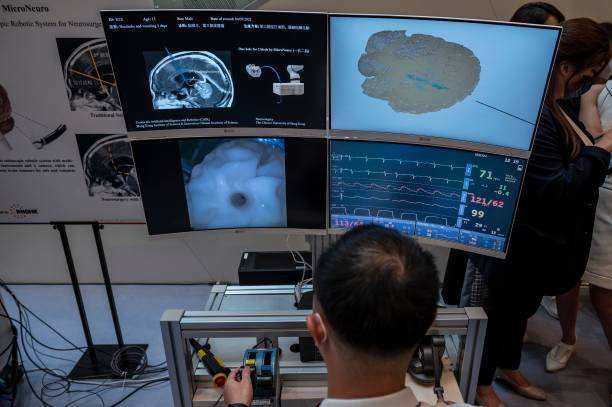Welcome to the exciting world of robotics coding! As technology advances, it’s becoming clear that robots will play a more significant role in our lives. But what does it take to make these fascinating machines function? The answer lies in the magic of collaboration between robotics and coding experts.
In this blog post, we explore the importance of teamwork and partnerships when designing and building robots through programming languages like Python or Java.
So grab your keyboard and let’s dive into why collaboration is crucial for success in robotics coding!
Introduction to Robotics Coding
In order to understand the importance of collaboration in robotics and coding, it is first important to understand what robotics and coding are.
Robotics is the branch of technology that deals with the design, construction, operation, and application of robots and computer systems for their control, sensory feedback, and information processing.
Coding is the process of transforming computer instructions into a form a computer can understand. In order to code a robot, one must first have a detailed understanding of how the robot works.
The importance of collaboration in robotics and coding lies in the fact that these two disciplines are very closely related.
In order to code a robot effectively, one must have a strong understanding of both robotics and coding. This is why it is so important for those who wish to pursue careers in either field to collaborate closely with one another.
By working together, they can share knowledge and ideas that will help them to better understand both disciplines.
It should be noted that there are many different types of robots that can be coded.
For example, there are industrial robots that are used in manufacturing plants to build products. There are also service robots that are used in hospitals or other care facilities to assist patients or staff members.
Then there are personal robots that people use for tasks like vacuum cleaning or mowing the lawn.
The type of robot will dictate what sorts of coding instructions are necessary to get it to perform its desired tasks.
No matter what type of robot is being coded, a collaboration between robotics experts and coding experts must collide.
See also: Top 15 Best Computer Programming Schools For Kids in Nigeria in 2024
Understanding the Different Types of Robotics Coding
There are different types of robotics coding, and it is important to understand the strengths and weaknesses of each before deciding which one to use for a particular project. The most popular types of robotics coding are:
#1. Structured Text
This is the most common type of code used in industrial robotics applications. It is easy to read and understand, making it ideal for collaboration between engineers and programmers.
However, it can be difficult to debug and optimize, making it less suited for complex applications.
#2. Behavior Tree
This type of code is commonly used in video games and simulations. It allows for more realistic behavior by robots but can be very difficult to understand for beginners.
#3. State machines
This approach is often used in embedded systems where real-time constraints make other approaches impractical. State machines are easy to understand but can be difficult to maintain as the number of states grows.
Benefits of Collaboration in Robotics and Coding

There are many benefits of collaboration in robotics and coding. One benefit is that it allows students to work together to solve problems.
When students work together, they can share ideas and help each other troubleshoot. This can lead to a more efficient and effective problem-solving process.
Additionally, collaboration can help students develop their interpersonal skills. Working together with others can help students learn how to communicate effectively and compromise when necessary.
These are important skills that will be beneficial in any future career endeavors.
Finally, collaborating on robotics and coding projects can simply be more fun than working on them alone! When students are enjoying themselves, they are more likely to be engaged and motivated in their learning.
See also: Top 10 Best Kids Coding Languages to Learn in 2024
Strategies for Effective Collaboration
There are many benefits to collaboration in robotics and coding. One of the most important is that it allows for a division of labor.
When multiple people are working on a project, they can each take on different tasks, which can make the process more efficient and less time-consuming.
Another key benefit of collaboration is that it allows for different points of view to be represented. When multiple people are working together, they can bring different perspectives to the table.
This can help to make sure that all sides of an issue are considered, and that the final product is the best it can be.
Finally, collaboration fosters a sense of community. When people work together on a project, they form bonds and relationships. This can lead to a stronger team dynamic and a greater sense of camaraderie.
There are many strategies that can be used to facilitate effective collaboration. One is to establish clear goals and objectives from the start.
This will ensure that everyone is on the same page from the beginning and knows what needs to be accomplished. Another strategy is to establish roles and responsibilities for each team member.
This will ensure that everyone has a specific task to focus on and that there is no duplication of effort. Finally, it is important to have regular communication between team members.
This will ensure that everyone is aware of what others are working on and can offer assistance if needed.
Implementing Collaborative Practices for Successful Projects
As technology advances, so does the importance of collaboration in the workplace. In particular, robotics and coding are two areas where working together can be extremely beneficial.
There are a number of reasons why collaborative practices are important for successful projects.
First, when multiple people are working on a project, they can bring different perspectives and ideas to the table. This can help to make the project stronger and more innovative.
Second, working collaboratively can help to improve communication within a team. When team members are able to openly share their ideas and thoughts, it can lead to a better understanding and execution of the project as a whole.
Third, collaborative practices can help to build trust within a team. When team members feel like they are able to openly communicate and work together towards a common goal, it can create a sense of trust that is essential for long-term success.
Finally, collaborative practices simply make projects more fun! When team members are able to work together and have some friendly competition, it can make the entire process more enjoyable for everyone involved.
Overall, there are many reasons why collaborative practices are important for successful projects. In the world of robotics and coding, working together can help to create stronger and more innovative products.
Furthermore, collaborative practices improve communication, build trust, and make projects more enjoyable for all those involved.
See also: 8 Best Coding Games for Kids that Teach Real Programming Concept
Examples of Successful Collaborative Robotics Coding Projects

There are many examples of successful collaborative robotics coding projects.
One well-known example is the ROS (Robot Operating System) project, which was started in 2007 by Willow Garage. ROS is now used by many companies and organizations worldwide, including NASA.
Another example is the Robot Web Tools project, which was started in 2010 by the Robotics Consortium at Stanford University.
The goal of this project is to provide a web-based interface for programming robots. This project has been used by companies such as Google and Microsoft to develop their own robot programming interfaces.
Yet, another example is the CoSpace Rescue project, which was started in 2012 by MIT. This project aims to create a 3D virtual world that can be used for training rescue robots.
This virtual world has been used by several robotic teams around the world to train their robots for real-world disasters.
Conclusion
Collaboration in robotics and coding is essential for the industry’s growth and advancement.
By utilizing teamwork, creativity, problem-solving skills, and communication techniques, innovators are able to come up with solutions faster and more efficiently than ever before.
Robotics coding encourages collaboration between all members of a team, from designers to developers to testers, ensuring that every step is taken into account for an optimal result.
In addition to streamlining development timeframes and other processes related to robotics programming projects, the collaboration also fosters trust among team players and leads to better outcomes overall!
Frequently Asked Questions
There are different types of robotics coding, and it is important to understand the strengths and weaknesses of each before deciding which one to use for a particular project. The most popular types of robotics coding are:
Robotics is the branch of technology that deals with the design, construction, operation, and application of robots and computer systems for their control, sensory feedback, and information processing.
Coding is the process of transforming computer instructions into a form a computer can understand. In order to code a robot, one must first have a detailed understanding of how the robot works.
There are many benefits of collaboration in robotics and coding. One benefit is that it allows students to work together to solve problems.
When students work together, they can share ideas and help each other troubleshoot. This can lead to a more efficient and effective problem-solving process.
Recommendation
- The Role of AI in Robotics | Artificial Intelligence and Its Implications for Kids
- Coding and Robotics BootCamp for Kids | All You Need To know
- The Future of Robotics; How Kids Can Prepare for a High-Tech Future
- 10 Ways on How Coding Can Help Kids In Problem-Solving Skills
- How to Build a Robot: A Step-by-Step Guide for Kids in 2024


